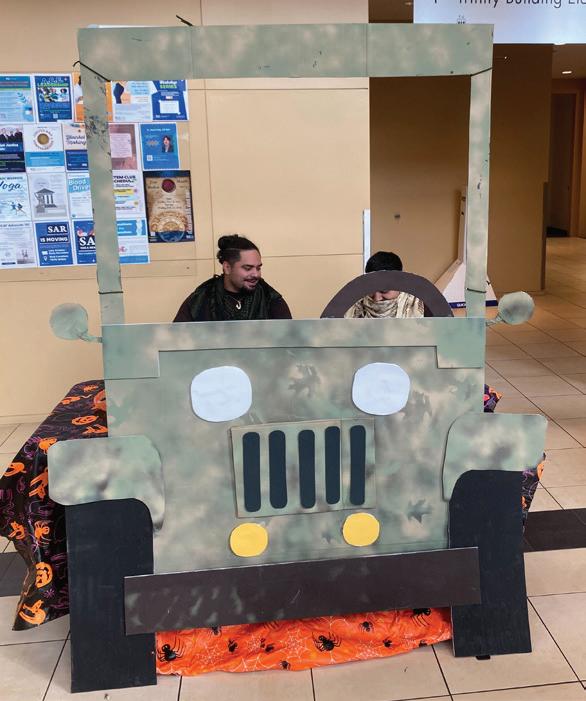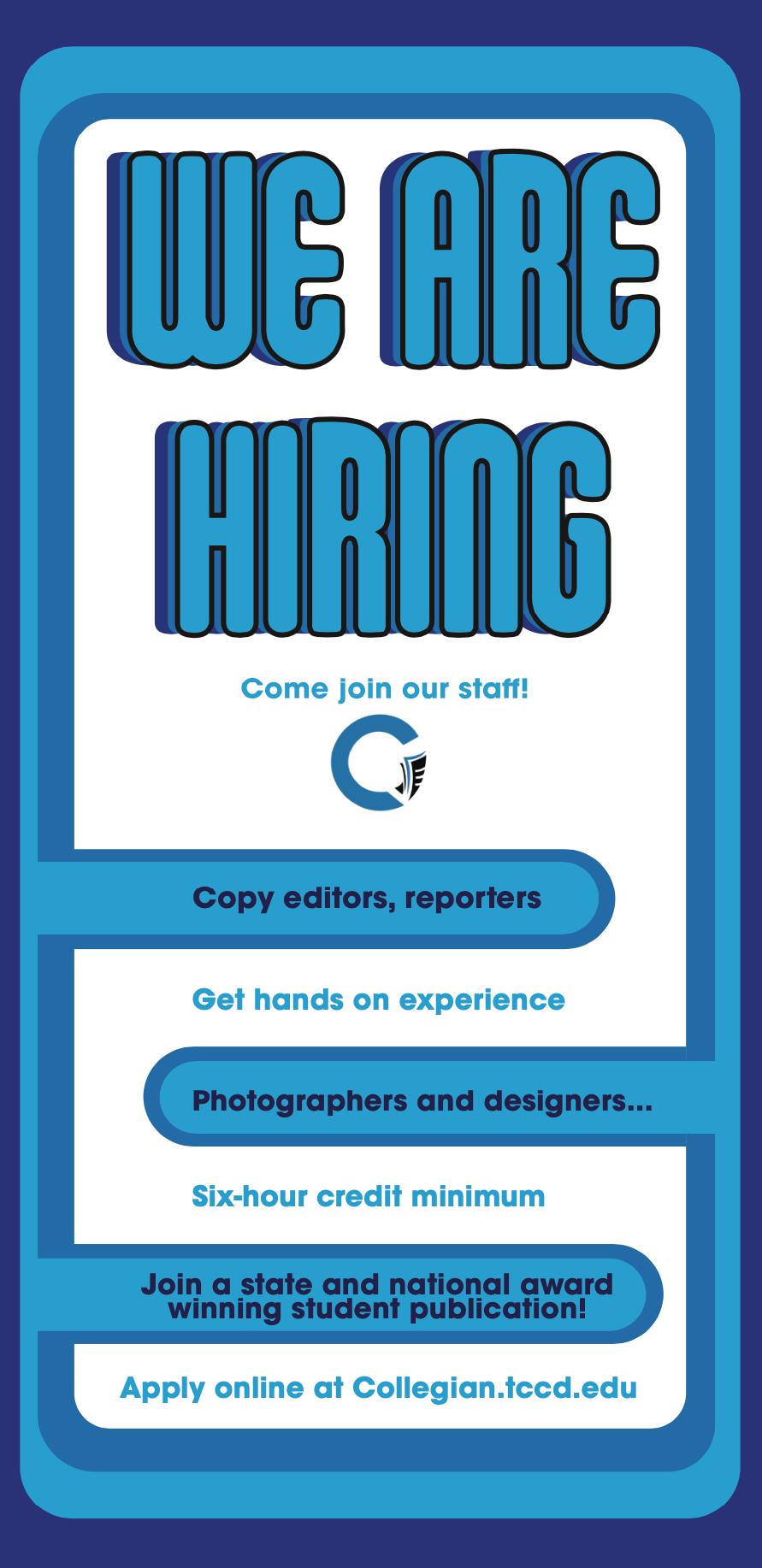Armed guards hired for overnight patrols

Alex Hoben/The Collegian Trustee Shannon Wood makes a public statement against Allied Universal Security’s contract amendment.


Alex Hoben/The Collegian Trustee Shannon Wood makes a public statement against Allied Universal Security’s contract amendment.
FOUSIA ABDULLAHI editor-in-chief
fousia abdullahi@my tccd edu
The TCC board approved the hiring of armed security guards from Allied Universal Security to patrol all campuses from 10 p.m. to 6 a.m.
Allied provides armed security officers and security professionals and is the largest security company
in the United States, according to the National Association of Security Companies. In 2024, Allied employed 304,000 and had 402 offices.
“This coverage helps us make sure that our campuses are covered 24 hours per day, seven days per week,” said Chief Financial Officer Pamela Anglin.
The college had a previous contract in February 2022 that had Allied providing armed security services at the Tarrant County College Opportunity Center and the Erma C. Johnson Northwest Center for Excellence for Aviation, Transportation and Logistics.
The contract amendment to hire Allied for a one-year optional renewal will cost the college up to $1.5 million. The new contract began on April 1 and will end on
March 31, 2026.
Trustee Shannon Wood voted against the motion at the March 13 monthly meeting. The matter was discussed in closed session. When they returned to open session Wood made a public statement about why she voted against the amendment.
“My question is what happens if there’s a security risk or shooting on a campus by an armed security guard?” she said. “Having security guards that are armed without police trainings is opening up the college to litigation and a public publicity nightmare. I’ve been entrusted by the constituents of District 2 to be a guardian of not only their tax dollars, but also the students, faculty and guests of the college. I cannot in good conscience allow the allow the safety of the students, fac-
ulty and guests of the college to be at risk by approving armed security officers when we have TCC police officers to fill the role.”
She said TCC had three years to hire additional police officers to fill the security gaps, and that it made more sense to spend the $1.5 million on hiring more TCC officers.
Trustee Kenneth Barr shared Wood’s concerns but voted in favor of the motion, saying he and the other board members are aware of incidents outside of TCC that involved poorly trained officers.
“I wanted to understand the training and experience and background checks that the company did. I thought the explanations were good and made sense,” Barr said.
DIEGO COLLAZO campus editor diego.collazo@my.tccd.edu
Before Phi Theta Kappa, Rojelio Vela said he only saw himself as a helping hand in his community and never thought he could be a leader.
That changed when he and other PTK members from every TCC chapter won awards at this year’s PTK regional convention, held March 6-8 in Houston.
“Being a part of PTK made me realize that I love working with teams and that I like to lead,” he said. “[Winning] felt amazing, and I can honestly attribute it to the work the chapter has done. Even though I’m the president, nothing would run without the members.”
South Campus PTK adviser Melinda Pereda said the convention was the perfect environment for collaboration, growth and fun, with workshops, music and speeches happening all weekend.
The SE chapter, Beta Delta Omicron, won the District II Texas regional president position for the second year in a row with Leslie Zacarias being named president.
Vela, a member of the South chapter, Rho Chi, was elected Texas regional vice president for District II and received the Hall of Honor Award, given to chapter officers for excelling in their work. Before his chapter nominated him for vice president and gave him its full support during his campaign, he had to rise through the ranks, starting as the chapter’s president.
HUDA QURESHI managing editor huda.qureshi@my.tccd.edu
Over 60 students and faculty gathered in the intimate event space of NE Campus College Hall to listen to gay Asian-American poet Chen Chen read his poetry for the Living Literature event put on by the English department on March 25.
As Chen read a selection of poems, the room was filled with various reactions, from laughs to tears. His poetry focuses on various topics including reflections on a trip to the zoo and memories of complicated immigrant experiences.
“I found it really inspiring,” NE student Kinsley Carter said. “I liked the connection between mundane, regular life events and extremely personal things, and how that makes it universal to anyone and easy to digest.”
Carter also wants to pursue poetry but hesitates to share vulnerable emotions with an audience. After the event, she asked Chen what she could do to get over this fear, and he recommended going to an open mic to perform.
“I feel like that could help, because it’s a lot easier to talk to a bunch of strangers than your friend or your parents,” Kinsley said.
Chen has two published books, “When I Grow Up I Want to Be a List of Further Possibilities” and “Your Emergency Contact Is Experiencing An Emergency.” He has won the A. Poulin Jr. Poetry Prize, Thom Gunn Award for Gay Poetry, and the GLCA New Writers Award.
Chen uses his poetry to touch on issues in groups that have been historically marginalized and hopes his words will make people feel less alone in their struggles, the way poetry and literature did for him.
“It would mean a great deal to me if my work could do that for someone else,” he said.
Carter is part of the LGBTQ+ community herself and said Chen’s boldness in talking about his identity was appreciated.
“I loved having a queer person up there speaking about the cycles of acceptance and non-acceptance,” she said. “It’s a little scary right now to try to be a writer. It’s very hard for people to take you seriously.”
The following day, Chen was featured at two “craft talks” in NSTU Center Corner where he read work from some of his inspirations including an essay by Jenny Zhang called “How It Feels” and “Concerning the Book That Is the Body of the Beloved” by Gregory Orr. The event was held in a bigger event space, so it had almost double the audience of the reading.
In response to a question about the humor in his poems, Chen said it’s an important part of what he hopes to accomplish with his writing.
He often blends humor with sorrow, for example in his poem “Doctor’s Note” he starts it off with “Please excuse Chen Chen from class. He is currently dead.” He follows it up with a casual humorous tone of what killed him and what might bring him back to life, “prescribed long baths in chicken stock.” The tone shifts when he brings up how his parents might react to his “death.” In their voice he says “You’d be better off dead. Better than whatever you are with other men.”
“It’s kind of it’s a coping mechanism,” he said. “It’s a survival technique. It’s creative. That’s where I feel like my poems really come alive, is when I embrace that [humor] even just a little bit.”
In her introduction for Chen,

Alex Hoben/The Collegian Guest speaker and poet Chen Chen reads from his published book “When I Grow Up I Want to be a List of Further Possibilities.”
After seeing the reaction Chen had on the crowd, Carter hopes to make someone feel that way with her work in the future.
“The passion of it, sharing yourself in a moment where you feel alone, having a room of people crying over your pain,” she said. “It makes you feel like a community, like you’re making a difference.”
NE associate professor Rebecca Balcarcel presented the question of whether poetry matters in today’s world. She argued it is important because in the way it encapsulates the human condition and the mastery over language. Poetry isn’t specifically constructed just to make you feel stupid when you read it with old language or difficult text,” she said. “I think instead, we all have experiences that make us want to capture them or investigate them, and the poems are how humans have done this.”

For nearly seven years, TCC students have had access to free public transportation through the EasyRide program—a resource that allows thousands to save money and navigate the city. The program allows all eligible students, which the TCC website classifies as students enrolled in at least three credit hours or 48 continuing education hours, to use their student ID cards as a free pass. Eligible students can access Trinity Metro buses, MINIMOVERS, On-Demand rideshare vans, TEXRail and the Trinity Railway Express by swiping their student ID in the farebox or showing their ID to conductors.
However, the program does not extend to students in College for Kids, Senior Education, Dual Credit or Early College High School.
Trinity River Campus student Alexandria Williams has been riding the bus for two years and said her perception of public transportation has changed over time.
“There aren’t many downsides,” she said. “At first, I worried about cleanliness and safety, but now I feel comfortable riding regularly.” She said the buses are generally punctual, with delays occurring only due to traffic or other uncontrollable circumstances.
Students are not limited to TCC locations. They can use their student ID to get free rides anywhere the local transit services go, all week long.
A map and more information on bus and On-Demand service routes can be found on TCC’s website under the public transportation section.
Trinity Metro also offers a paratransit service for individuals with verified disabilities that prevent them from using regular city bus services. It provides door-to-door transportation on a fixed daily schedule, with the first passenger pickup starting at 4:20 a.m. Monday-Saturday and 6 a.m. on Sundays with the last pickup at 11:15 p.m. daily. Students interested in the paratransit service must complete an application and be
NW Campus shed light on the dangers of digital deception and the importance of online literacy for Misinfo Day.
James Baxter, assistant director for library services, provided historical and current examples of misinformation and supplied resources for students to help distinguish fact from fiction in a presentation hosted on March 13.
Baxter said the spread of misinformation is a growing concern, especially within online spaces.
“Social media platforms are moving away from third-party checking,” he said. “It’s just getting more complicated, and all the indicators are that it’s not going to get better anytime soon. That’s why we want to teach students how to make those judgments for themselves.”
He said while many college students have grown up in today’s digital environment, they still have unique challenges when navigating digital information.
“Most young people are very adept users of technology but they’re not adept at researching,” he said. “They get a false sense of confidence and security that they’re finding good information.”
Baxter said fabricated information online may lead students astray when deciding their future.
“If students aren’t getting accurate information about political candidates or political parties, they could wind up voting for someone that they wouldn’t have had they had bet-

Assistant director of library services James Baxter adresses common mistakes when finding information in online spaces and how to identify misinformation.
ter information,” he said. “There’s also a lot of misinformation about careers. These days, students don’t always avail themselves with the best information resources when they’re evaluating careers.”
Baxter discussed AI’s potential role in falsifying information.
“[AI] is a burgeoning situation sometimes designed to influence voters, or just create chaos,” he said. “It’s making everything harder to verify what’s real and what’s not. People are now doubting everything, any kind of image or picture, and it’s understandable.”
SE librarian Melissa Washington said teaching students the danger of misinformation goes beyond their educational success.
“If students don’t get the proper informa-
tion and do the proper research, and they’ll believe in things that are incorrect,” she said.
“Fake news is a real thing, and students are quick to share things that aren’t real. Then, other people believe those things, and then they share those with other people.” Washington said the misinformation threatens the credibility of print publications as well.
“I always tell students, even with print, to check the sources,” she said. “Do a background check on the author and make sure they have the proper credentials.” She warned that the reason people share unfounded information may not be with the best intentions.
“A lot of beliefs are created by an idea
that ‘I know what’s best,’” she said. “But you get more clicks being fake.”
However, Baxter offered suggestions to quickly review the validity of an article or publication, including reading beyond a “click-bait” headline, and independently researching the author and news outlet. Be skeptical of information found on social media platforms, get your news from professional sources, and be aware of confirmation biases within ourselves and others,” he said.
Baxter introduced the SIFT method, a technique aimed at helping students competently evaluate content online.
Developed by faculty at the University of Washington, the SIFT method encourages readers to stop consuming content that appears false or misleading, investigate the source, find an alternative source and trace claims to verify legitimacy.
Patricia Mansilla, a South Campus student studying criminal justice, said the presentation opened her eyes to the prevalence of misinformation and its impact on her career
“Sometimes, whenever I’m reading, I’ll read halfway through and if I agree, then I think this is a good source,” she said. “But getting to the end of the article could change my perspective on what I thought I was reading and what it’s really about.”
Mansilla said that previously, she largely judged a site’s credibility on its appearance.
“I tend not to believe articles that have more pictures because it feels like it’s just trying to pull me in with visuals,” she said. “I look for the format, but that just shows I have to check my sources on a more professional level.”
ASH PETRIE feature editor ashleigh.petrie@my.tccd.edu
National Plant a Flower Day flourished on SE Campus as students painted pots, planted flowers and sowed seeds on March 12.
Student Activities hosted the event for students, and employee Alex Searsy sat at the front table checking them in.
“For this event, we have some information they can take about pollinators, like the m ona rch butterfly. That’s one of our local ones.” Searsy said.
She said the pamphlets gave students a simplified explanation on how pollination works, and which Texas plants attract pollinators. After signing in, students were given a pot and directed to a table covered with acrylic paints and brushes to decorate with other students. After the paint dried, one w ould pick from a selection of flower seeds to plant inside their personally designed pot.
Students could choose from either cosmos, sunflowers, marigolds, China asters and
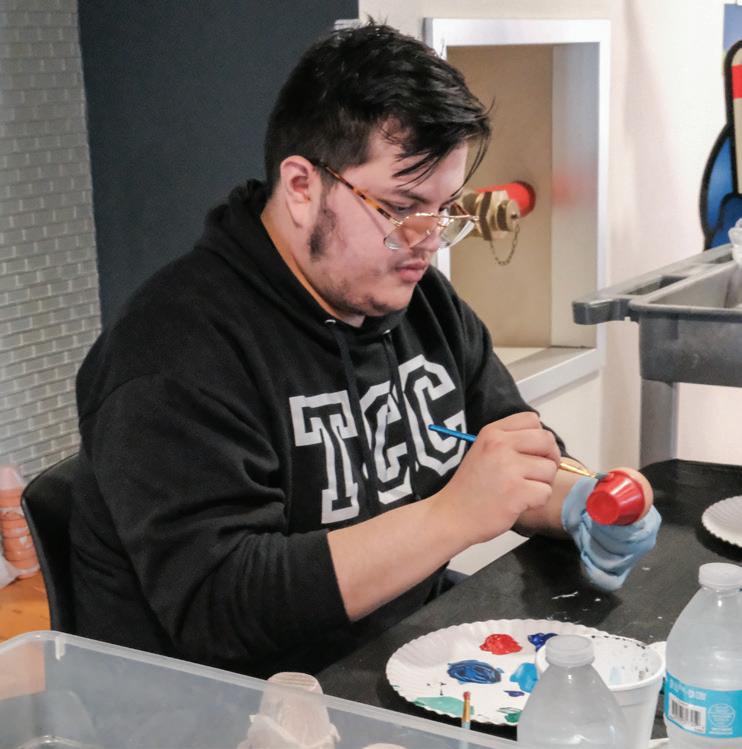
zinnias. Each flower s seed packet had a short description of how to plant it, the amount of water and sunlight it would need and the expected length of its growth period.
Pin wheels were placed on the table as well for students to decorate with markers while waiting for their flowerpot to dry.
Se a rsy said it was also to give everyone something to take home that resembled a bloomed flower since students would have to wait for their potted plant to grow.
The event was to give students an educational experience.
“Planting the flower, it kind of gives [students] that connection to the earth. We’re promoting pollinators and giving them a personal piece of it,” Searsy said.
SE Environment Club Madelin Alvarenga said she felt the event was a good experience for students to engage in a fun and relaxing event while also learning valuable information about Texas’ vast ecosystem.
“You also get to take care of the plant afterwards, so you will see it grow and see all your work that you put in,” Alvarenga said.
She sat mixing blue, white and red to achieve what she said was the perfect purple.
“I’m really enjoying it because it does take your stress away,” Alvarenga said. “It’s making a mess, but it’s a good mess.”
Also mixing colors together to create a very specific blue was Mason Richards. He was accepted into a Drum Corp group called Crossmen and painted his pot in the colors of their ‘24 uniform, blue and orange.
Richards graduated from high school last spring, making this his second semester at TCC. He said he attended the event because he wanted to try getting more involved on campus.
“I haven’t really done much the whole semester, so I thought this was a good place to start because I saw people already engaged,” Richards said.
He said he had originally intended to visit a different event on SE Campus but stumbled upon this one and decided to stay.
“I feel very relaxed and happy doing

something with my peers,” Richards said.
Student Grace Halliday said she also felt at ease while painting her current hyperfixation, the Dressrosa Arch in “One Piece.”
With a plate full of red, green, yellow, blue and black, Halliday outlined her pot with im-
(continued from page 1)
“The main thing is, we don’t want armed people working for security service campuses that haven’t been well trained. And we also don’t want people who have been dismissed from other employment for incidents that shouldn’t have happened.”
In the amended agreement, the college has expanded the use of security officers by adding a position at the Off-Site District Multipurpose Center on Riverside Drive. ODMC houses district facilities, personnel, asset management or inventory control, district records and archives and warehous-
ing. The position at ODMC will provide protection from 6 p.m. to 6 a.m., and security officers will patrol the parking lot in a college vehicle. At the March 6 board work session, trustees raised questions about using Allied instead of TCC police officers. Wood questioned TCC Chief of Police Shaun Williams about the pay rate comparison between TCC police and the security company and how the security officers are trained. “I’m just concerned because my thought
is we know how we train our officers and we know they’re trained very well and we trust them,” Wood said. “Now, I understand it’s at night, so that’s a totally different situation. If we’re just saving a little bit of money, I’m not sure that it’s not better to have our own officers.” Williams said that one of the main reasons they decided to use security contractors was because of the difficulty in filling those positions. However, that could change. “Now that we’ve been able to increase the salary for the officers, we’re hoping in the
portant symbols from the anime.
“It’s not a great painting, but I try and that’s what matters,” Halliday said.
The event kicked off the beginning to what she said would be a worry-free spring break with absolutely nothing planned for.
future we can supplement those officers back and then we can just have all of our certified officers in all three shifts,” he said. NE student Lyra Moncivais, who takes night classes and has friends who are on
of training with their weapons to feel somewhat safe.”
“That transition from a local officer position to a regional officer position is going to be a big one,” he said. “I’m not just in a position of helping now. I’m in charge, and anything I do I always put in my full effort. Just like I did with [chapter] president, I plan to that do here.”
Vela acknowledged the stress and hardships of both positions but credits his advisers and fellow PTK members for always keeping him motivated.
“Having the community around me and knowing that they believe in me to fulfill that position is really what allowed me to believe I have the capabilities to fill the position,” he said. “I’ve seen all of the officers work very hard and be proactive in the work we do.”
One of those officers is vice president of services Patricia Mansilla, who also received the Hall of Honor Award for her work with the chapter.
“The VP of services works with the TCC campuses to reach out to other organizations to see if we can collaborate and plan events, but it can be difficult since people are busy,” Mansilla said. “That’s when my training and getting help comes into [play].”
Mansilla said some of the work they’ve done at TCC includes working with the Fresh Market and volunteering for the Gobble Wobble run and Toys for Tots.
“It was just an opportunity to help out TCC with things they already had going on,” she said. “We’re just doing our part. So, when it was announced that our chapter and I got awarded, it was mind-blowing because I didn’t think we were going to win.”
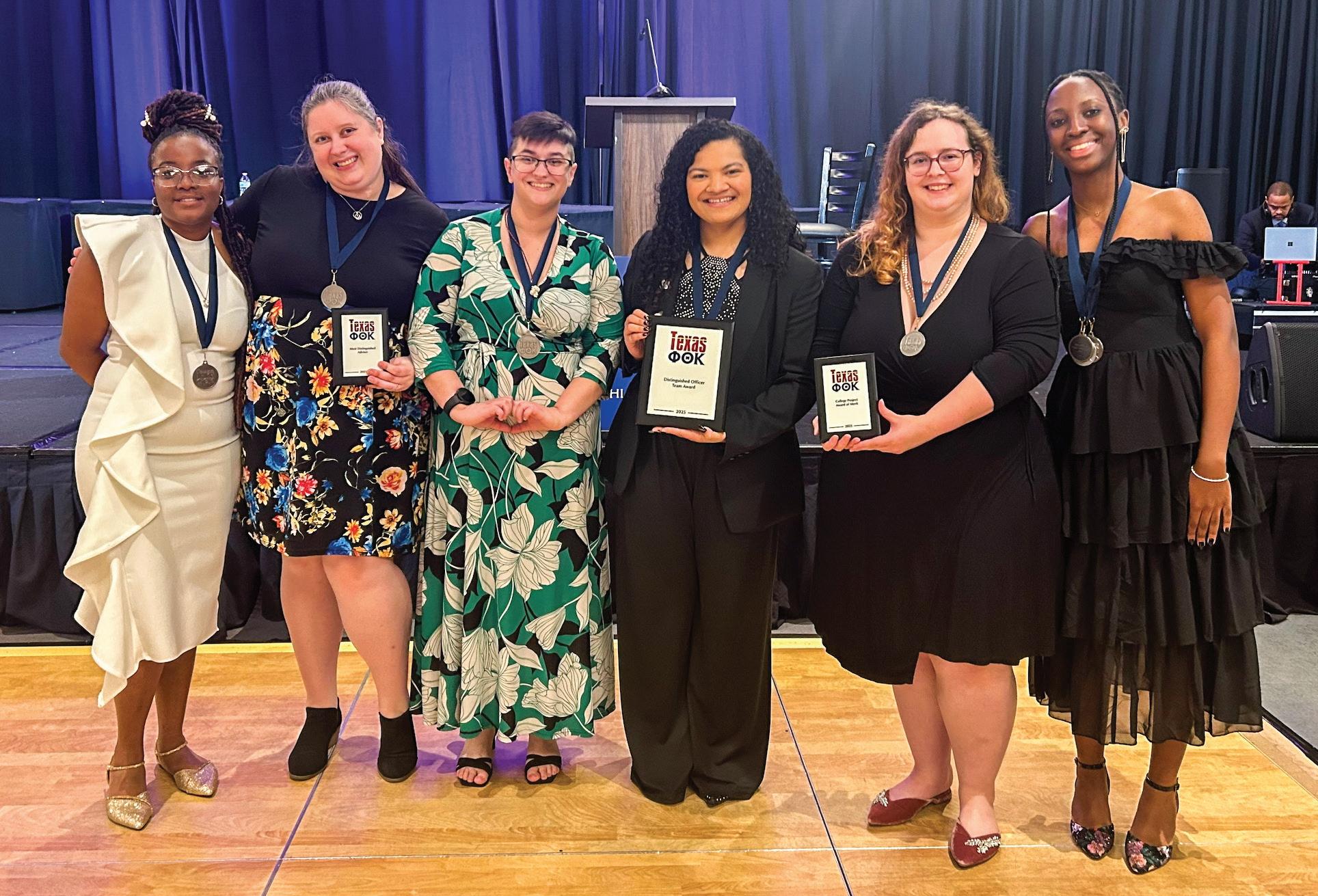
Vela and Mansilla were not the only Rho Chi members to win awards, as the chapter itself also received multiple honors.
“Being
Rojelio Vela District II Vice President
Rho Chi was named a five-star chapter recognizing the chapter’s outstanding work. They also earned the College Project Award of Merit for a research project focused on educating people about the inaccurate depiction of the cowboy. It was also named a top Texas chapter, ranking ninth in the state.
Other TCC chapters also had a night full of wins.
Officers Marie-Claude Mutomb and Sina Mansiela of the NE Campus chapter, Phi Tau, won the Hall of Honor Award. Phi Tau officers were also recognized as a Distinguished Chapter Officer Team.
Some of the other awards Phi Tau won
(continued from page 1)

include a College Project Award for having one of the top 30 projects in the Texas region and being named a five-star chapter.
While students took home numerous honors, faculty advisers were also recognized for their contributions to PTK’s success.
Phi Tau adviser Jeanell Buck was awarded the Most Distinguished Adviser Award for Texas.
Fellow Phi Tau adviser Samantha Elkins, who won a Hall of Honor Award for chapter advisers, said Buck’s win is significant as the Hall of Honor Award is given to 20-30 people, with the top overall recipient receiving the Most Distinguished Honor.
Trinity River Beta Sigma Mu chapter ad-
students can visit Ride Trinity Metro.
Nicole Adams, strategic partnership manager for Trinity Metro, said the program is possible thanks to a grant from the North Texas Council of Governments, a voluntary association that assists local governments with regional planning.
“COG covers the fare for TCC students,” she said. “Every month, whatever that cost is, it is invoiced and sent to COG. TCC has agreed to match that, and whatever the total is goes into the TCC scholarship fund.”
She said on average, TCC bus stops have more than 5,500 rides each month, with fixed bus route services arriving every 15-30 minutes and On-Demand services able to have a unit arrive in about 12-15 minutes.
Harold Riley has been a Trinity Metro bus driver for 17 years. He said that in his experience, he doesn’t notice many students taking advantage of their free passes.
“I know all the routes and know what customers are getting on and off. I don’t see many students riding,” he said. “The buses don’t go down into neighborhoods, but our On-Demand service does.”
viser Jerrica Jordan received a Paragon Award for new advisers.
Madelyn Bowman, who has been a Rho Chi adviser for 11 years and received a Continued Excellence Award, said the recognition means a lot to the TCC chapters.
“It validates all the hard work we’ve done and is a point of pride for the campuses,” she said. “Students learn leadership, organization and project management skills … Our members tend to do well when they transfer, so it’s about what they can do after PTK with what they’ve learned.”
The remaining PTK chapters were contacted for verification of their awards but did not respond before publication.
The On-Demand service is accessible through the GoPass app. The app allows students to book rideshare vans, plan trips and track estimated wait times and ride details, according to the TCC website.
In the fourth quarter of 2023, Trinity Railway Express reported 142,200 unlinked passenger trips, a 6.77% increase compared to the same quarter in the previous year, according to a public rideshare report by the American Public Transportation Association. Despite the program’s benefits, some students may be unaware of it or find it inconvenient. Riley’s observation suggests that increasing awareness and accessibility could encourage more participation.
South campus student Jason Roshto agreed with the sentiment, saying more people should ride the bus.
“I’ve been riding the bus since April and haven’t encountered any challenges,” he said. “I recommend people show up five minutes early and use the GoPass app. It’s the most accurate as far as the arrival time and it’s more reliable than google maps.”









Stalking was reported on NE Campus in which an individual’s safety was threatened by an individual more than once. The case was closed through internal discipline.
Theft of property less than $100 was reported on SE Campus.
An intentional use of abusive or profane language was reported at TR Campus.
Assault was reported on NE Campus in which an individual felt they were physically offended by another individual.
Public intoxication was reported in NW01.
A harassment case occurring in January was reported to SE Campus police.
A report of Clery stalking occurring in January was reported to SE Campus police.
A report of possession or purchase of an e-cigarette by a minor was reported in NW05.
Possession of less than one gram of a penalty group 2 substance was reported in NW05.
Drug law violations reported in NW05 under the Clery Act remain in an active investigation.
An intentional use of abusive or profane language was reported on TR Campus.
A car wreck on South in parking lot 1 was reported resulting in damage to a vehicle of less than $200.

“Inflation would affect me because I’m planning on being a teacher in the future, so teachers’ supplies and the cost of living is really affected. I’m more worried about my future with inflation ... Companies will do giveaways, like Staples, they give big teacher discounts. So, there’s options, but it’s still a concern.”

“Gas prices have gone up tremendously. If gas prices do go down, it’ll make it a lot easier for me to spend money on other things, like going out with friends or going to a football game or concert. I try to travel less and not go as far so that I’m not using so much on gas.”

“Inflation is pretty bad because we can’t afford to eat. We can’t basically afford to live ... [Inflation will impact] pretty negatively, especially with food being at the price it is right now, and gas is a little bit on the cheap end. Rent is especially going to be hard.”
Q: “How will inflation affect you?”
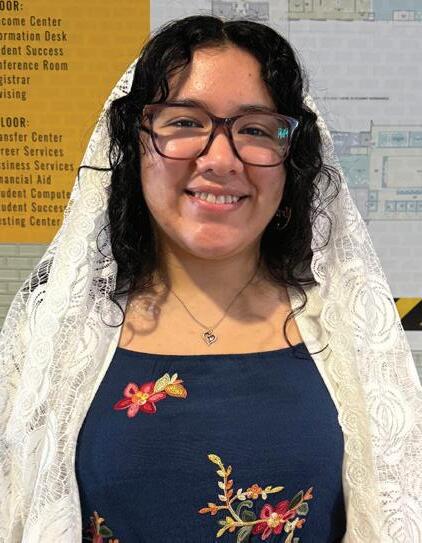
“Inflation would affect me because I barely get paid minimum wage, and the cost of living is just a struggle for me, to be honest. I work at Walmart, and I work part time because I am in school. So, with the bills that I have, I’m just barely keeping up paycheck to paycheck.”
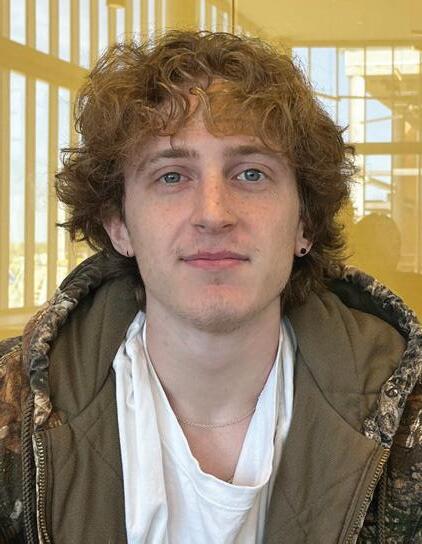
“I don’t eat out as much anymore, I honestly can’t afford it. I don’t make enough money to go out and spend on fast food every day, so I always try and eat at the house now. I stay at home a lot more because I don’t want to go and fill my tank up. It’s really expensive.”
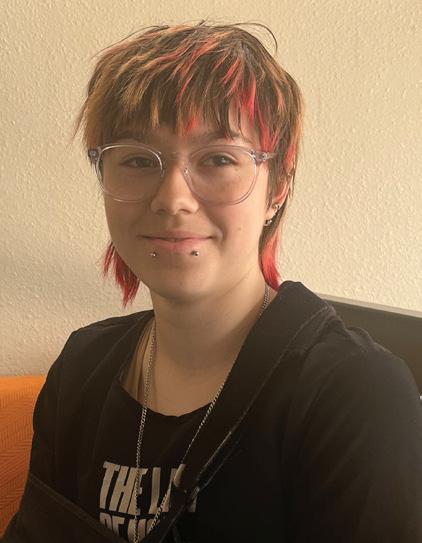
“It’s not really a question of how it will affect me. I mean, how won’t it? It affects everyone in every way. It’s not just the prices of eggs are increasing. It’s the prices of everything. It’s the price of living. And I also think personally, like, I’m Gen Z, and I’m on the younger end of Gen Z as well. So, its very much impacted how I view the future because you hear all these people talk about, like, ‘Oh my God, how are we gonna afford to live?’ And I’m thinking, ‘Oh, well, that’s just how I’m gonna grow up.’”

“I don’t think inflation has impacted me at all. The only thing I pay for is gas, and I mostly use my father’s car. I don’t work and I live with my father. My dad mentioned a few of the groceries were going up, like eggs. We’re not really big egg eaters, so we don’t buy them often, but since they went up, we
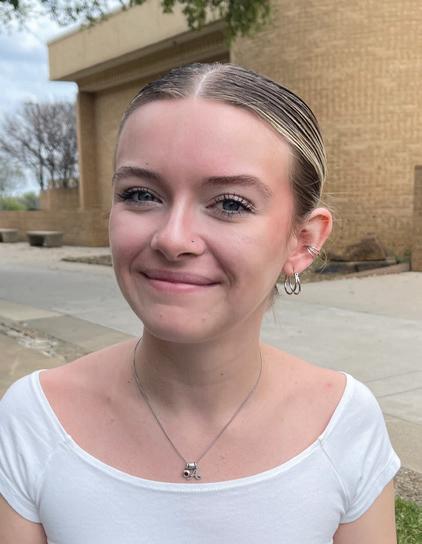
“I don’t have a job and I’m depending on allowance for my dad. If prices go up, I am not able to buy anything except gas for my car. But when I graduate, I want to do sales. So, if prices go up, then it’s not a bad thing. I mean, I’m just going to be making more money, more commissions, mixed opinions.”

“I feel like the amount I spend, either when driving from classes, spending on meals as well, it would go up for sure. I feel like it would affect me more in my daily routine, like when it comes down to shopping books or registering for classes.”

“The Day the Earth Blew Up: A Looney Tunes Movie” is one of the funniest films released in recent memory, and it’s not even close.
Fans of “Looney Tunes” could recall the great successes of ‘80s and ‘90s movies like “Who Framed Roger Rabbit?” and “Space Jam,” so it’s almost shocking that this is the first fully animated feature from the almost 100-year-old franchise.
The film follows the classic duo of Daffy
Duck and Porky Pig, both voiced by Eric Bauza, who were raised together by Farmer Jim. Farmer Jim leaves them in charge of their home and makes them promise to always stick together.
Daffy and Porky’s house falls into disrepair and after their roof is hit by a UFO, they fail a home inspection and must find jobs for the first time in their lives to pay for their roofing repairs.
They eventually get work at a gum factory thanks to Petunia Pig, voiced by Candi Milo, where they become entangled in a mysterious plot of an alien trying to control people’s minds.
Packed with the slapstick humor that made the franchise popular for decades along with classic horror and sci-fi references, it keeps both children and adults laughing throughout. The film is inspired by horror B-movies that were popular in the 1950s, and there are many references to them, most notably in the design of the alien antagonist.
The film takes a little while to get started. This could be because it was released
during a time when “Looney Tunes” just isn’t as popular as it used to be. Many children coming to the theater could be seeing these characters for the first time.
In this case, it actually works to have more time in the exposition to establish the dynamic between Daffy and Porky. Viewers get to ease into the fast-paced physical comedy and cartoon violence that made “Looney Tunes” an enduring franchise.
The animation in the film is in 2D and uses a mix of the early animation style of the “Looney Tunes” short films and the more contemporary style of modern kids’ animation. This makes for a nostalgic but still fresh look that is colorful and fun, especially in a world where 3D animation has almost completely taken over the market.
Both the film’s director, Pete Browngardt, and the voice cast have worked on “Looney Tunes” before. Browngardt is the developer of “Looney Tunes Cartoons,” a Warner Bros. Animation TV show that featured some of the same voice actors from the film.
The voice acting is what stands out the most about this film. Many of the modern animated films like “The Lego Movie” and “The Super Mario Bros. Movie” feature celebrity actors instead of professional voice actors.
While this is not a bad thing in itself, voice actors have completely different skillsets compared to traditional actors and are sometimes on another level when it comes to injecting energy into their performance while remaining versatile. Bauza is especially amazing in this film as he plays two completely different characters with their own unique voices.
With its absurd humor and charming animation, the people behind “The Day the Earth Blew Up” all came together to make a film that was obviously created with love and respect for the franchise while remaining distinctly its own film.
ASH PETRIE feature editor ashleigh.petrie@my.tccd.edu
Rebellious sounds emitted from a masterpiece spinning in my record player as I danced to its violent noise. Stomping to the bass as it segued through each track, I sang the brutal lyrics from a previous generation, recognizing I identified with its meaning unlike ever before.
Gang of Four’s “Entertainment!” is a playfully aggressive fusion of punk, funk, rock and dub. It innovated the monotonous and simple punk sound by introducing waves of vastly different melodies to its raw energy, establishing the unique 80’s post-punk revolution.
Punk is known for being anti-capitalistic and preaching non-conformity. Its community created a space for individuals to question, rebel and seek truth when listening to its reverberating noise.
Gang of Four’s album doesn’t tiptoe around their focus, but what makes the pugnacity of its rebellion stand out is how “Entertainment!” comments on society.
By naming their band after a leadership faction in the Chinese Communist Party, and the album cover satirically displaying an American colonizer taking advantage of an Indigenous person, their political statement is heard before ever pressing play
However, instead of aiming their ballads toward blaming a specific political ideology or person as predecessors would, their rage targets the complacent and obedient person inside of all of us.
Each song alludes to different social and political issues without blatantly saying it.
Using news headlines, advertisements, ethical standards and religious rhetoric, Gang of Four captivates the listener by its familiarity with one’s routine.
Once drawn in, one will hear ballads narrating stories of love, lust and greed sung by a tightly wound voice. On the surface the album blandly describes daily life, but after reading between the lines its stone-cold monologue criticizes capitalistic society.
Materialism, systematic conditioning and life becoming a commodity, the narrator seemingly gives up in every funky fight.
Gang of Four’s lyrics consider people impotent and unwilling to shake up the status quo due to their complacency for a simple life.
Ironically, the album’s title “Entertainment!” is the band’s way to acknowledge creating a collective sound that people will undoubtedly dance to and never actually listen to.
Gang of Four’s distinct sound admittedly puts me into a great mood. My teenage angst felt a unique rage develop from its sound in my youth, but as an adult I realize 1979 and 2025 have many unfortunate similarities, and I’m just as frustrated by people’s vanity as Gang of Four was then.
“Ether,” the first song on the album, is a call and response between a member of British Society and the Irish Republican Army during one of the many ruthless attempts to end British rule in Northern Ireland.
The British socialite nasally sings “locked in heaven’s lifestyle,” while the IRA member forcefully chants “locked in Long
Kesh,” a controversial prison facility used by the British government known for its inhumane practices holding Irish citizens without trial.
Britian preferred keeping control of a country not associated to them, acting shocked when violence broke out. The government chose to detain and remove individuals in an act of civil justice rather than putting an end to the senselessness.
Members of British society refused to acknowledge the sadistic acts of their government and continued through their mundane life as if hundreds weren’t dying roughly 50 miles away.
Today, Americans gullibly obey and listen to the ones in power as if they are God, refusing to acknowledge the genocide still taking place that our glorious savior was supposed to remove us from.
While the meaning of “Ether” was laid out for the listener, the rest of the album takes on a vaguer approach.
Following the political argument, every song following hits with the same militant and edgy guitar, layered with a groovy bass and technical drum. Gang of Four comments on the loss of humanity as the economy is more of a concern to those in control than life’s pleasure.
The two songs standing out the most to me are “Damaged Goods” and “Love like Anthrax.”
“Damaged Goods” discusses the dependency society has on purchasing unnecessary items through a song about lust. Describing the rush of purchase as the flirtatious beginnings of a lustful romance, Gang of Four con-

“Entertainment!” is the debut album of English post-punk band Gang of Four, released September 1979. tinuously mock the consumer. Love is used as a theme for almost all their songs, a word known to make people irrational, and “Love like Anthrax” sums up the album by explaining what love means.
“My head’s not empty, it’s full with my brain. The thoughts I’m thinking like piss down a drain ... Love will get you like a case of anthrax, and that’s something I don’t want to catch.” Love is capitalism, fascism, apathy and everyone disregarding what they can see.
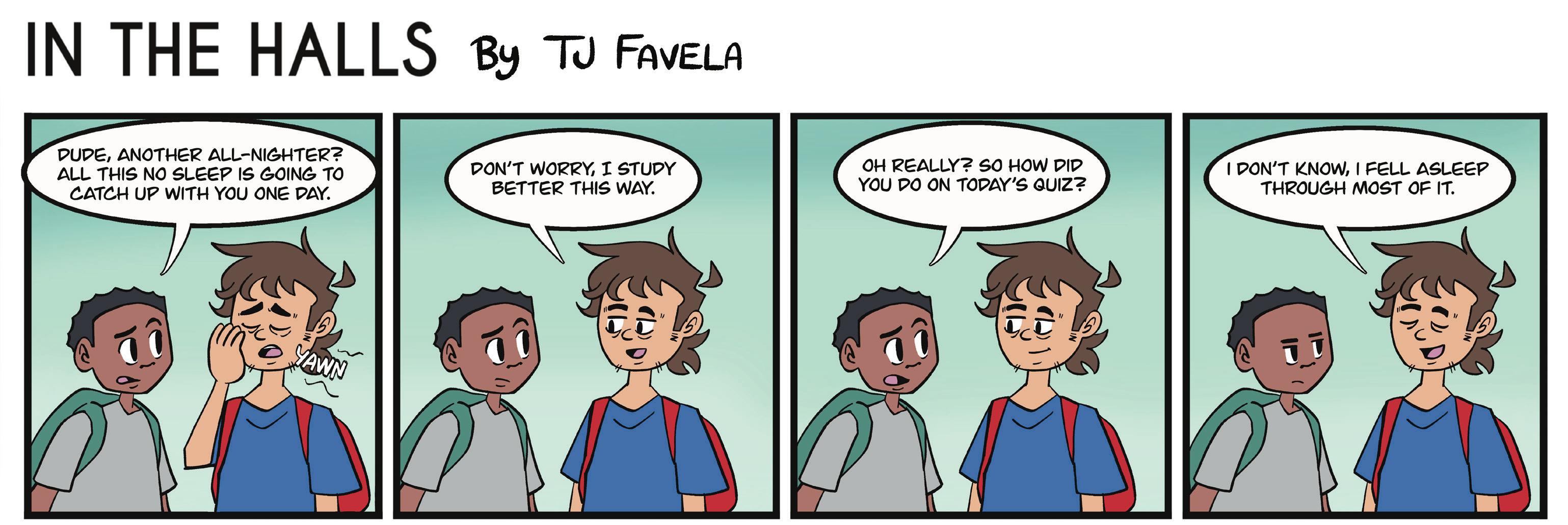
The dismantling of America’s checks and balances continued over spring break as President Donald Trump issued yet another controversial executive order.
No, it’s not to bring down the price of eggs, but it does put the Department of Education on the chopping block.
The Trump administration’s war on students and education is hitting close, too close to home for many college students who depend on federal student loans. Secretary of Education Linda McMahon, whose background is in business and World Wrestling Entertainment, was directed by Trump to start dismantling the department.
McMahon led the Small Business Administration in Trump’s last presidency. Not coincidentally, Trump then announced that the SBA would assume oversight of student loans furthering his agenda to privatize the federal government.
While officials in this administration throw darts at one government department after the other, they fail to acknowledge that dissolving the Department of Education would require an act of Congress, which hasn’t stopped McMahon from laying off half of the department’s workforce.
According to the Pew Research Center, the department had 4,209 employees in September. This represents only 0.2% of federal employees.
This raises the question of why such a small workforce is being aggressively gutted. Why leave only 2,000 employees in place given the impact it will have on students and college administrations in the coming academic year?
The federal government spends
As the end of the semester approaches, assignments become more frequent, projects overlap and a student’s failure is again falsely blamed on the instructor.
Regardless of a course’s curriculum or a teacher’s instruction style, struggling students too often point the finger at anything except their unwillingness to make the effort necessary to pass.
The students glued to their phone cite boring lectures as their reason for poor grades. The student notorious for leaving early claims they haven’t learned anything useful by the final exam.
It’s a pattern that stems from some peoples lack of accountability or self-awareness, and it’s not
Beauty will always be an undefinable, nebulous concept. So, the term “beauty standard” is already failing to be anything but a made-up concept for made-up ideals to carry on manufactured, dangerous insecurities such as those surrounding weight.
A beauty “ideal” can become lethal. The eating disorder community on various social media platforms, such as X, is an upsetting example. It’s a community made up of young women determined to lose weight by any means possible. Common posts in the community include images of extremely thin women labeled “thinspo”, calorie-counting meals, obsessive BMI tracking, aggressive fatphobia and constant encouragement from fellow

money to help students attend college. If the government is now spending less, how many students will be hurt?
In 2024, the net cost of the department’s operation was $4 billion. This number varies yearly and increased in 2024 because of former President Joe Biden’s expanded eligibility for student loan forgiveness.
The Free Application for Federal Student Aid applications, and other federal aid programs have schools scrambling to determine how this will impact Fall 2025 enrollments.
Whether it’s DEI offices in colleges or infringing on students’ civil rights. Trump’s supporters are talking about gutting Social Security, Medicare and Medicaid, all of which are important tools that help make life easier for so many people, especially those who are low-income, blue-collar Americans trying to survive.
How will an already rocky FAFSA system deal with a shortage of workforce? Will students be able to get funding by the payment deadlines? How will funding like Pell Grants and the federal work-study program be impacted?
The Department of Education’s policies also safeguard equal access to education through its Office of Civil Rights and funds charter schools. It protects against discrimination such as sexual, disability and age discrimination, and other issues that fall under civil rights.
It oversees the college accreditation system by reviewing all federally recognized accrediting agencies, ensuring that these agencies meet standards and provides oversight for the post-accrediting system.
The University of Texas at Ar-

LAUREN HARPER multimedia editor lauren.harper903@my.tccd.edu
unique to college students. Teachers in grade schools are seen as the primary point of contact for student learning. Parents and students alike look to them, especially during early elementary

HUDA QURESHI managing editor huda.qureshi@my.tccd.edu
users to lose weight. As they become thinner and thinner, they gain more followers.
Their comments are filled with encouragement and compliments, no matter how unhealthy they look.
Many users in the community have

lington has taken a proactive step in trying to find out more information and then, in turn, provided this information to students, staff and faculty regarding all these executive orders coming out.
They have a webpage dedicated to executive orders, and it categorizes them by which departments are affected by them and gives employees who are working at the school timely information as to how this might impact the functioning of the school.
FAFSA has been downsized due to layoffs and contract buyouts, and it currently employs only 1,400 people.
FAFSA already had glitches
and delays at the start of the 20242025 academic year. We could see even longer wait times during this upcoming academic year.
What we are seeing is an unprecedented overreach by the executive branch, and it’s not just the federal government but is trickling down to the state government too.
House Bill 8 ties funding for community colleges to measurable student-focused outcomes. For students, success means the ability to graduate and find a job or transfer to a university to get a bachelor’s degree. If these cuts are made, how will students pay their loans to attend classes? If they don’t, how will the
college have enough graduates to maintain funding?
Students should make sure to apply for the FAFSA as soon as possible and also reach out to their campus financial aid offices for help with the application process. The 2025-2026 TCC Foundation Scholarship Application is open now. Students who want to apply should fill out an online application and provide one professional reference to be considered for hundreds of scholarships, with an average scholarship of $800 a semester. Students are being left out on their own but staying informed and proactive will help minimize the impact on their educational dreams.
school years, to develop a child’s excitement to learn.
But when that responsibility is placed solely on the teacher, the student doesn’t recognize their role in the outcome of their education. If not corrected by parents, this disconnect carries over into college and the workforce.
It’s the same logic as refusing to water a plant and blaming the nursery cashier when it dies. It could be the quality of the seed, but if you’re not willing to nurture your education, it’s doomed to wither.
Published studies from the National Insititute of Health and U.S. Department of Education confirm the correlation between teaching styles and a class’ success. How in-
been hospitalized due to their condition but frequently relapse due to the appeal of being seen as beautiful.
It can even be deadly. In the example of eating disorders, the idea of beauty becomes so warped that there are some users who aspire to the term “deathspo” which includes images of severely underweight women.
A big part of many eating disorders lies with the addiction factor of maintaining a certain weight, but it certainly starts off with a superficial desire to be thin, the standard.
As the beauty standard starts to disintegrate into an addiction related to extreme control over food intake, it’s difficult to do anything but calorie-count and “bodycheck” above any other priority. What starts off as
formation is presented has a documented impact on retention.
But a lecture’s effectiveness is hard to criticize if you don’t attend.
When teachers make an effort to diversify their instruction, which often requires discussion and engagement, the students previously complaining about the course’s redundancy, now complain about the additional effort.
As districts continue to lose funding, and schools are forced to shut down or downsize, the teacherto-student ratio makes individualized learning nearly impossible.
This means it’s now more important than ever for students to understand how to take control of their education, and what resources are
a desire to be “pretty” can turn into something lethal taking over your life.
The discussion of beauty should be paired with what’s so appealing about meeting beauty standards. It’s not difficult to see how people treat those they consider “pretty” better. Most people have experienced it themselves, whether it’s the difference of losing weight or wearing makeup, fulfilling a beauty standard can be the difference between having someone’s attention or disregard.
We are currently stuck in a particularly brutal time to pursue being considered beautiful. It’s never enough and it never ends, and it’s focused on all the wrong things.
There’s nothing wrong with



available to fill in gaps left by onesize-fits-all curriculum.
As daunting as it seems, we as students have access to an endless library of learning material and are not limited to what and how an instructor teaches. Outside stress such as a fulltime job or family responsibilities comes with being a higher education student. Something uncontrollable inevitably occurs which could impact attendance or assignment completion.
Perfection is unattainable, and striving for it often does more damage than good.
What we do have control over is our attentiveness and dedication to success.
being invested in beauty but it needs to be approached differently than it currently is in American society. Ideally, physical appearance should be a very small part of what beauty is. It should be much more abstract and aligned with morality and the actions a person takes. It feels like we are at a point of no return and well, we might be. However, it’s still worth trying to reframe what is beautiful in people.
Being stick-thin and having perfectly clear skin should take a backburner to someone who makes you laugh or someone who takes the time to listen to you.
Appreciating people’s actions as what makes them beautiful will help to distance us from toxic standards no one will ever meet.

As veteran students walk into the TR Veteran Resource Center, its open layout offers a place where they can unwind in between classes or have access to oncampus or veteran-related information.
At a time when transitioning from military service to civilian life can feel overwhelming, the VRC works to provide a welcoming, safe and supportive environment. Whether students are grabbing a cup of coffee or simply taking a moment to decompress, the resource center is a space where they can feel at home, far from the pressure of school and life.
“Literally everything in the resource center is a onestop shop from your advising to your counseling,” TR veteran counselor Carla Cauley said.
Cauley and academic adviser Vanessa Duran help ensure each student not only succeeds academically but also thrives personally, making the transition to college

by Cheyenne Shawn
life smoother and more supported.
TR veteran student
Dominique Walker said every question he has ever asked Cauley was either answered or she would point him in the right direction.
“They have been a big help when it comes down to guiding me in the right direction when it comes to my mental health,” Walker said about the counselor and academic adviser available in the VRC. “Also, lending an ear to listen when I felt overwhelmed and stressed out with my studies or personal life.”
Other students talked about how they’ve gained more knowledge about the benefits available to them, including more educational benefits, resources on campus, scholarships and grants offered for veterans.
“The Veteran Resource Center is very knowledgeable about veteran benefits, different resources that veterans can utilize on our dayto-day lives,” TR veteran student Shamarah Tezeno.
Usually, the first thing many veteran students will
mention when describing the VRC is the camaraderie they find there. They’ve found a place where they can connect with other veterans about their shared experiences while in the service or how it was transitioning to civilian life.
“If you go to the Veterans Resource Center, nine times out of 10 anytime you’re in here, you probably are going to make a connection with someone,” TR student and Army reservist Jahsai Hunter said.
Since Cauley has taken the job as the veteran counselor, she has tried to create a sense of community. She started organizing a variety of events specifically tailored for veterans, from bringing in guest speakers for Coffee and Conversations to having a couple luncheons last semester like Veterans Day, Vetsgiving and Holiday Around the World. These events have been met with enthusiasm from the veterans.
“It’s really cool to see that someone actually appreciates us and is willing to put in that much effort
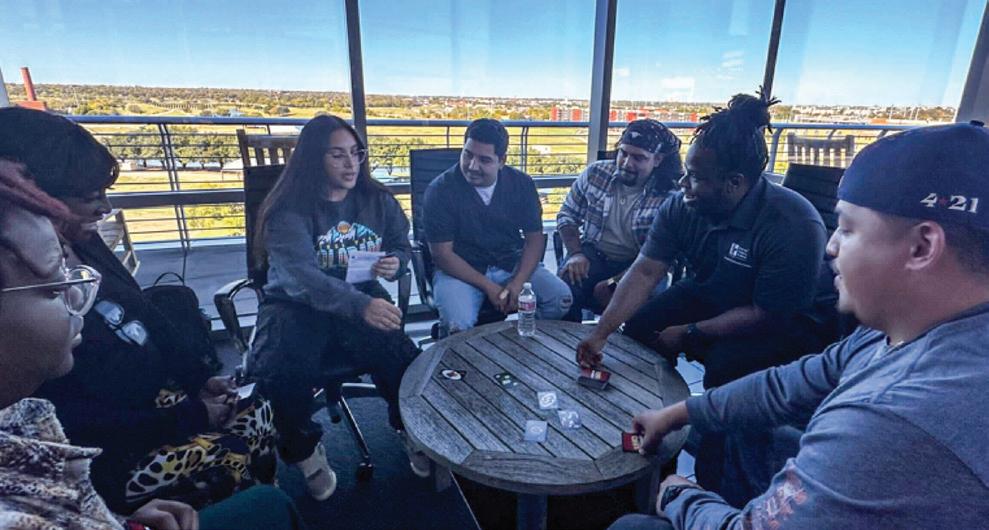
for us,” TR veteran student worker Elijah Alvarez said.
In addition to offering emotional support, the VRC has a dedicated adviser who helps guides students unsure about school and what paths they want to take. Alvarez expressed how she helped him figure out his classes and set his schedule up so that he would be in line for the degree plan he wanted.
The VRC has been impactful for those veteran students who utilize it. It has created a sense of belonging and support for those who have served.
“I think it’s a huge benefit to our community to be able to have somewhere where we can feel comfortable and make friends while we’re also receiving help from people who are in a sense aren’t afraid of us,”Alvarez said.
Hunter said it’s an inviting place where it’s easy to get to know everybody.
“You almost have a second family here,” he said.
